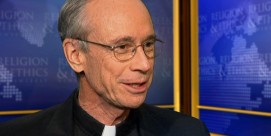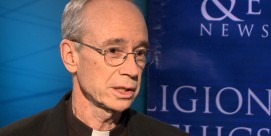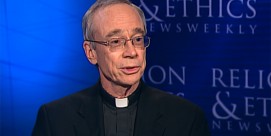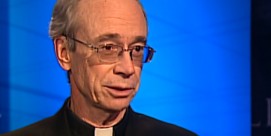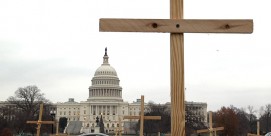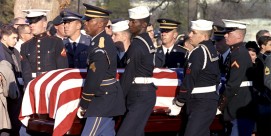In This Episode << SLIDE LEFT TO SEE ADDITIONAL SEGMENTS
Father Thomas Reese
Read more of Kim Lawton’s interview about Pope Benedict, the Vatican, and foreign policy with Father Thomas Reese, S.J., senior fellow at Georgetown University’s Woodstock Institute:
Q: What is the Vatican apparatus for the pope’s foreign policy?
A: The pope in Rome has a whole bureaucracy that helps him in his work as pope, and one of the agencies that he has there is called the Secretariat of State. One branch of it deals with relations with states, and so that’s the key foreign policy apparatus of the Holy See.
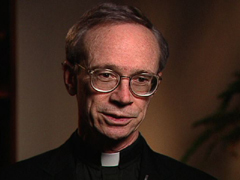 Q: Talk about the ambassadors and the envoys at the pope’s disposal.
Q: Talk about the ambassadors and the envoys at the pope’s disposal.
A: The pope has diplomatic relations with almost every country in the world, except China, and they’re working on that one, trying to get that one fixed up before the Olympics, and these ambassadors do exactly what other ambassadors do. They talk to the countries. They report back to the Vatican. They’re also very important in dealing with the local church, especially in the appointment of bishops. Every country that has diplomatic relations with the Holy See has an ambassador who goes to Rome and represents their country. For example, Mary Ann Glendon is the ambassador from the United States to the Holy See, and their job, of course, is to represent the views of their country to the Holy See, so that when the pope speaks out on foreign policy issues they have had a chance to get their suggestions in before the pope speaks.
Q: And the Vatican also has people the pope sends around?
A: And then the pope has ambassadors, or what they call nuncios, who represent him in every country with which the Holy See has diplomatic relations. So in the United States, for example, the nuncio, the pope’s representative to the United States, would be talking to people in the State Department, finding out the views of the U.S. government on various issues, and he would also be representing the pope to the American Catholic Church and especially having a prominent role in the appointment of bishops.
Q: How important has the role of the Vatican been globally, and how has it changed over the years?
A: The Holy See and the pope have been involved in diplomatic relations for centuries, since countries started talking to one another — in fact, since countries came into existence — and the papacy has always been involved in trying to bring about peace between nations. For example, it did that between Argentina and Chile at one time when they were getting ready to fight. It’s also been a force for talking about the rights of refugees, the importance of forgiving Third World debt. It’s been a strong supporter of the United Nations and, before that, of the League of Nations. So the popes, especially in the 20th century and this century, have been very strong voices for peace and justice in the international area.
Q: Raising moral issues when people are talking about politics or economics — this has been a key part, hasn’t it?
A: The reason the pope is very interested in foreign policy issues, in international relations, is because he believes that these are moral issues. It’s not just about economics and power. It’s about moral and ethical issues — whether people live and die, whether people are fed, how refugees are treated, whether countries go to war or whether they have peace. All of these are strongly moral and ethical issues.
Q: What are some of the foreign policy priorities that have emerged in Benedict’s papacy?
A: Pope Benedict has been very concerned about what’s happening in the Middle East. Even when he was a cardinal, he opposed the invasion of Iraq. He’s been very concerned about the fact that Christians are being forced out of Iraq. He’s concerned about the state of the church in Israel and in other countries in the Middle East where Christians are fleeing because they’re getting caught in between all these parties that are in strife. He’s also been very concerned about what’s happening in Africa, in Darfur, in the Congo, and other places that have been very, very troubled, where people are dying and where refugees are fleeing from their countries. All of these have been things he’s been concerned about. One thing that he’s also been becoming more and more vocal about is concern about global warming. He’s very concerned about the environment. This may be our first green pope.
Q: What about relations with the Islamic world? Certainly those were a little rocky, and the pope’s Regensburg speech didn’t help matters. But then there was his trip to Turkey, and he’s tried to reach out. How would you characterize relations with the Islamic world?
A: Pope Benedict wants to have improved relations with the Islamic world. I think there were some missteps in his talk at Regensburg. He used some terminology that was misunderstood. But I think it’s clear that he wants to reach out. He wants to have dialogue with them. He wants to have cooperation between Christians and Muslims in working together for peace. I mean it’s clear that he and the Muslims are strongly in agreement that the world is becoming too secular, that relativism is a problem. I think he sees the possibility of an alliance between Muslims and Christians to raise certain ethical issues that are important to the world.
Q: You mentioned China. China has been a difficult problem for the church. How is this pope trying to mend relations with China?
A: This pope, I think, has a unique opportunity to work out some kind of an arrangement with China. Frankly, I think China was afraid of Pope John Paul II because of his impact on the Soviet Union and Poland and helping to bring down the [Berlin] Wall and the fall of Communism there. So the Chinese obviously didn’t want John Paul II running around China doing the same thing. Pope Benedict is not that kind of a threat to China, so I think they’re more comfortable in working out some kind of an arrangement. The area of disagreement is over the appointment of bishops. The Vatican is very strongly concerned that it have a role in the appointment of bishops and that the Chinese government not interfere in the appointment of Catholic bishops in China, and this has been the major area of controversy.
Q: He’s emphasized Europe, too, hasn’t he? There are all these places around the world, but this pope has been particularly concerned about Europe and especially preserving the Christian heritage of Europe.
A: Pope Benedict has been very concerned about Europe, because Europe was the place where Christianity grew so much and developed a real culture. He sees that that is really in decline, and Christianity is losing its power over Europe and its influence, and he’s very concerned about that. He talks about the growth of secularism, of relativism, consumerism, those kinds of things, and he’s been very strong in saying that we need to re-Christianize Europe. Europe has become practically missionary territory once again for the church, so that’s been a strong theme of his papacy.
Q: Pope John Paul II had a big interest in international affairs, and certainly in Communism, based on his own background. How does this pope compare with John Paul II?
A: John Paul II and Pope Benedict are very alike in terms of their positions on church policy, church practices. Remember that Benedict, or Cardinal Ratzinger at the time, was one of the key advisors of Pope John Paul II. They’re very, very different in personality. John Paul was this charismatic actor person with an acting background who was this bigger-than-life character on the world stage. Benedict is a much more retiring, much more scholarly, much more reticent type of personality. I think people have connected with both of them, but they are very different personalities. I think the times are different also. I mean we don’t have the Soviet Union anymore. What we have is the problems in the Middle East, which is where Pope Benedict has been directing his attention. He’s been directing his attention to the coming cataclysm that may come as a result of global warming and talking about that as a moral responsibility. So it’s both the personalities and the world in which they live that have changed. But for the most part, the policies and the positions of John Paul and Benedict have been very similar.
Q: Cardinal Ratzinger was a theologian and a teacher. As Pope Benedict, is it a challenge for him to understand his role as an international leader and not necessarily a scholar, an intellectual?
A: I think that Benedict has had some problems on the world stage, because I think sometimes he thinks he’s still in a classroom where he can use words that have technical meanings that he has defined and that students are supposed to understand and know. But when he says them on the world stage, people take them at their street-level meaning, and as a result there’s misunderstanding. This has been a problem for him a number of times in talking about different issues. John Paul had much more of an instinct for public relations, for communication, than Benedict does, so Benedict’s had to learn this on the job.
Q: Would one example of that be the Regensburg speech? What would be another example?
A: In the Regensburg speech, for example, he spoke about Islam as being irrational. Well, what he meant was that it’s a religion based on faith, where faith is much more important than reason. He wasn’t saying that Muslims are irrational, but that’s the way it was heard. This kind of terminology that he sometimes uses can cause problems. Another time was when he said that certain Protestant churches weren’t true churches because they didn’t have bishops, they didn’t have the sacraments. Well, that’s the way he defines churches. They don’t define churches that way. So suddenly it sounds like the pope’s saying “You’re not real churches,” you know, and so that caused some hurt feeling among the Protestant churches or communities. This has been a continuing problem with him, because he uses certain words in kind of a technical way, whereas people reading newspapers, you know, understand these terms in a very normal, street-level way.
Q: Does the world listen when the pope speaks? The pope opposed the Iraq war. The war still went on. He’s raised concerns about other issues. Is there an authority that comes with that voice?
A: Sometimes I’m afraid that in certain parts of the media the only thing that people pay attention to is when the pope says something about sex or abortion or those kinds of things. The pope has spoken out about his concerns about the state of Africa, the refugees there, the conflicts there. That never gets covered in the media. It’s pretty much ignored. But if he says one sentence about abortion, that makes the front page of newspapers. The pope’s concerns are much wider and bigger than the media cover. When he comes to the United States, if all you read about in the newspaper is what he says about abortion and gay marriage, then the media is not covering what the pope said, because he’s going to be talking about a lot of other issues — issues of peace, justice, refugees, world debt, the environment. All of these kinds of things are high on his agenda. I’m not saying he doesn’t care about abortion and gay marriage, but he cares about a lot of other things besides that, and that does not get covered in the media.
Q: But does it have a real impact on the ground? Is that concern translated into action and making people’s lives better?
A: The problem the pope has is getting his message from himself to people on the ground, and there’s only a couple of ways of doing that. One is through the media, hoping that they will cover what he says. That’s why he’s coming to the United States. That’s why he’s having these events. That’s why he’s going to the United Nations, so that when he speaks, his message will really be communicated to the world. The other way is through the channels of the church itself, and I think through the bishops and through priests and teachers in the church people have been trying to spread his message about his concern for issues of justice and peace and life.
Q: This pope doesn’t like to travel as much as the previous pope. Does that affect his message?
A: Of course. Benedict became pope at a much older age than John Paul did. John Paul had a number of years to travel and to do lots of things. Benedict realizes that his time is limited. His energy level is less than a 50-year-old, so he has to measure and focus on what he’s going to do with his time. For example, he’s written a book about Jesus, and he’s got another volume on Jesus coming up. He’s much more interested in focusing on his teaching role than doing all these pastoral visits around the world. I think he feels that, you know, John Paul did that, okay, that’s been done. I’m going to be focusing on something else.
Q: How important do you think Benedict’s United Nations address will be?
A: I think his speech to the United Nations will be the most important event during his visit. The visit to the White House is a photo-op. He has to go visit the president of the United States. That’s just required by diplomatic niceties. But, you know, what he really wants to do is to speak on the world stage about issues of peace, of justice, of life, of concern for the environment, concern for refugees. He wants to make the point that international relations should be governed by moral values, by ethics. You know, it’s not just about economics. It’s just not about power. It’s just not about military might. We have to guide our affairs as nations by real ethical principles and standards.
Q: How important is Benedict’s voice in the world today?
A: Well, the United States is the big super power. The Holy See is the big spiritual super power, and he is the one voice that everybody listens to around the world, and it’s so important that he do that, that he speak out on these ethical issues, because if he doesn’t, who will? So it’s extremely important that this message get out to not only the leaders of the world but to the people in the streets.

